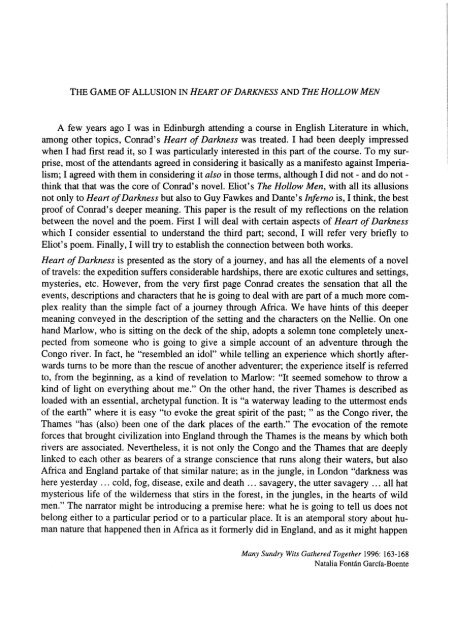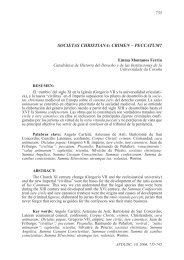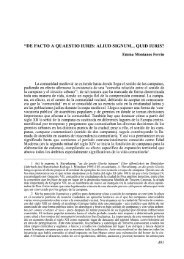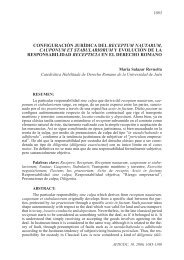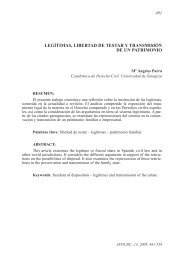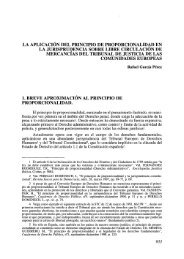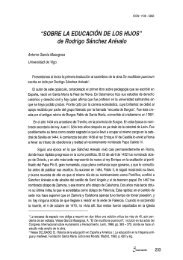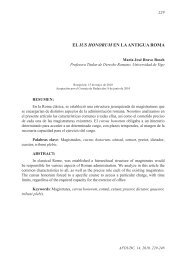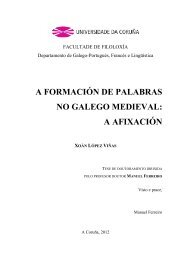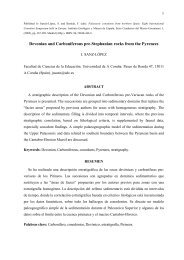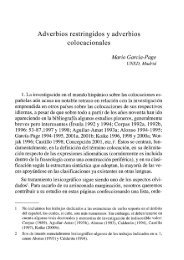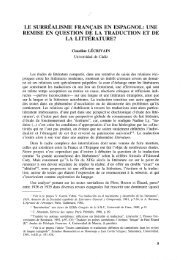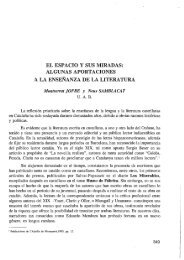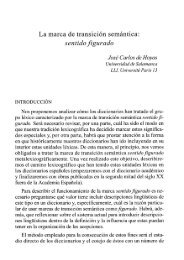The game of allusion in Hearth of Darkness and The ... - Ruc UDC
The game of allusion in Hearth of Darkness and The ... - Ruc UDC
The game of allusion in Hearth of Darkness and The ... - Ruc UDC
Create successful ePaper yourself
Turn your PDF publications into a flip-book with our unique Google optimized e-Paper software.
THE GAME OF ALLUSION IN HEART OF DARKNESS AND THE HOLLOW MEN<br />
A few years ago 1 was <strong>in</strong> Ed<strong>in</strong>burgh attend<strong>in</strong>g a course <strong>in</strong> English Literature <strong>in</strong> which,<br />
arnong other topics, Conrad's Heart <strong>of</strong> <strong>Darkness</strong> was treated. 1 had been deeply impressed<br />
when 1 had first read it, so 1 was particularly <strong>in</strong>terested <strong>in</strong> this part <strong>of</strong> the course. To my surprise,<br />
most <strong>of</strong> the attendants agreed <strong>in</strong> consider<strong>in</strong>g it basically as a manifesto aga<strong>in</strong>st Imperialism;<br />
1 agreed with them <strong>in</strong> consider<strong>in</strong>g it also <strong>in</strong> those terms, although 1 did not - <strong>and</strong> do not -<br />
th<strong>in</strong>k that that was the core <strong>of</strong> Conrad's novel. Eliot's <strong>The</strong> Hollow Men, with all its <strong>allusion</strong>s<br />
not only to Heart <strong>of</strong> <strong>Darkness</strong> but also to Guy Fawkes <strong>and</strong> Dante' s lnfemo is, 1 th<strong>in</strong>k, the best<br />
pro<strong>of</strong> <strong>of</strong> Conrad's deeper mean<strong>in</strong>g. This paper is the result <strong>of</strong> my reflections on the relation<br />
between the novel <strong>and</strong> the poem. First 1 will deal with certa<strong>in</strong> aspects <strong>of</strong> Heart <strong>of</strong> <strong>Darkness</strong><br />
which 1 consider essential to underst<strong>and</strong> the third part; second, 1 will refer very briefly to<br />
Eliot's poem. F<strong>in</strong>ally, 1 will try to establish the connection between both works.<br />
Heart <strong>of</strong> <strong>Darkness</strong> is presented as the story <strong>of</strong> a journey, <strong>and</strong> has all the elements <strong>of</strong> a novel<br />
<strong>of</strong> travels: the expedition suffers considerable hardships, there are exotic cultures <strong>and</strong> sett<strong>in</strong>gs,<br />
mysteries, etc. However, from the very first page Conrad creates the sensation that al! the<br />
events, descriptions <strong>and</strong> characters that he is go<strong>in</strong>g to deal with are part <strong>of</strong> a much more complex<br />
reality than the simple fact <strong>of</strong> a journey through Africa. We have h<strong>in</strong>ts <strong>of</strong> this deeper<br />
mean<strong>in</strong>g conveyed <strong>in</strong> the description <strong>of</strong> the sett<strong>in</strong>g <strong>and</strong> the characters on the Nellie. On one<br />
h<strong>and</strong> Marlow, who is sitt<strong>in</strong>g on the deck <strong>of</strong> the ship, adopts a solemn tone completely unexpected<br />
from someone who is go<strong>in</strong>g to give a simple account <strong>of</strong> an adventure through the<br />
Congo river. In fact, he "resembled an ido!" while tell<strong>in</strong>g an experience which shortly afterwards<br />
turns to be more than the rescue <strong>of</strong> another adventurer; the experience itself is referred<br />
to, from the beg<strong>in</strong>n<strong>in</strong>g, as a k<strong>in</strong>d <strong>of</strong> revelation to Marlow: "It seemed somehow to throw a<br />
k<strong>in</strong>d <strong>of</strong> light on everyth<strong>in</strong>g about me." On the other h<strong>and</strong>, the river Thames is described as<br />
loaded with an essential, archetypal function. lt is "a waterway lead<strong>in</strong>g to the uttermost ends<br />
<strong>of</strong> the earth" where it is easy "to evoke the great spirit <strong>of</strong> the past; " as the Congo river, the<br />
Thames "has (also) been one <strong>of</strong> the dark places <strong>of</strong> the earth." <strong>The</strong> evocation <strong>of</strong> the remote<br />
forces that brought civilization <strong>in</strong>to Engl<strong>and</strong> through the Thames is the means by which both<br />
rivers are associated. Nevertheless, it is not only the Congo <strong>and</strong> the Thames that are deeply<br />
l<strong>in</strong>ked to each other as bearers <strong>of</strong> a strange conscience that runs along their waters, but also<br />
Africa <strong>and</strong> Engl<strong>and</strong> partake <strong>of</strong> that similar nature; as <strong>in</strong> the jungle, <strong>in</strong> London "darkness was<br />
here yesterday ... cold, fog, disease, exile <strong>and</strong> death ... savagery, the utter savagery ... all hat<br />
mysterious life <strong>of</strong> the wildemess that stirs <strong>in</strong> the forest, <strong>in</strong> the jungles, <strong>in</strong> the hearts <strong>of</strong> wild<br />
men." <strong>The</strong> narrator might be <strong>in</strong>troduc<strong>in</strong>g a premise here: what he is go<strong>in</strong>g to te11 us does not<br />
belong either to a particular period or to a particular place. lt is an atemporal story about human<br />
nature that happened then <strong>in</strong> Africa as it formerly did <strong>in</strong> Engl<strong>and</strong>, <strong>and</strong> as it might happen<br />
Many Sundry Wits Gathered Together 1996: 163-168<br />
Natalia Fontán Garcfa-Boente
Natalia Fontán García-Boente<br />
Somehow, the mystery <strong>of</strong> the jungle is just the reflection <strong>of</strong> the mystery <strong>of</strong> man. <strong>The</strong> darkness<br />
<strong>of</strong> human nature is mirrored <strong>in</strong> the African l<strong>and</strong>scape. In both the truth is concealed: "the<br />
<strong>in</strong>ner truth is hidden - luckily ... But 1 felt it all the same; 1 felt <strong>of</strong>ten its mysterious stillness<br />
watch<strong>in</strong>g me."<br />
In the Congo river both past - primitivism - <strong>and</strong> present - civilization - are fused <strong>in</strong> the same<br />
way as they are <strong>in</strong> the human m<strong>in</strong>d. "<strong>The</strong> m<strong>in</strong>d <strong>of</strong> man is capable <strong>of</strong> anyth<strong>in</strong>g - because everyth<strong>in</strong>g<br />
is <strong>in</strong> it, all the past as well as all the future." That is the reason why Marlow considers<br />
that the terror <strong>of</strong> the crew is not caused by the attack <strong>of</strong> the natives so much as by the fact that<br />
they were confront<strong>in</strong>g with that substantial truth: "<strong>The</strong> danger, if any ... was for our proximity<br />
to a great human passion let loose." <strong>The</strong>refore, <strong>in</strong> that sail<strong>in</strong>g through the Congo river, <strong>in</strong><br />
that <strong>in</strong>ward pilgrimage "<strong>in</strong> the night <strong>of</strong> frrst ages" man must call on his <strong>in</strong>nate strength to<br />
avoid temptation <strong>and</strong> then come out illum<strong>in</strong>ated from that experience.<br />
That is the great difference between Marlow <strong>and</strong> Kurtz. Both are conscious <strong>of</strong> the nature <strong>of</strong><br />
their pilgrimage, but Marlow ends up with a broader knowledge <strong>and</strong> experience <strong>of</strong> himself<br />
<strong>and</strong> <strong>of</strong> the world whereas Kurtz is lost <strong>in</strong> the tangle <strong>of</strong> obscure <strong>and</strong> mysterious forces because<br />
he· "was hollow at the core." He lacks the strength that might have saved him: "Mr Kurtz<br />
lacked restra<strong>in</strong>t <strong>in</strong> the gratification <strong>of</strong> his various lusts . . . there was someth<strong>in</strong>g want<strong>in</strong>g <strong>in</strong><br />
him." However, he is conscious <strong>of</strong> the nature <strong>of</strong> his journey <strong>and</strong> therefore discovers his own<br />
reality as well: "the ... wildemess ... had wispered to him th<strong>in</strong>gs about himself which he did<br />
not know," although this only happens at the end <strong>of</strong> his life: "the knowledge carne to him at<br />
last, only at the very last", when he is already fac<strong>in</strong>g his death <strong>and</strong> he has an <strong>in</strong>stant <strong>of</strong><br />
supreme coscience: ''<strong>The</strong> horror! <strong>The</strong> horror!" Nevertheless, <strong>in</strong> spite <strong>of</strong> all that horror that fall<br />
on him at the moment <strong>of</strong> his death, Marlow declares: "Kurtz was a remarkable man. He had<br />
someth<strong>in</strong>g to say. He said it." We can underst<strong>and</strong> this affrrmation compar<strong>in</strong>g Kurtz with other<br />
characters <strong>in</strong> the novel. Throughout this peregr<strong>in</strong>ation among nightmares we can see three<br />
different groups <strong>of</strong> people. First, Kurtz is aware <strong>of</strong> the trascendence <strong>of</strong> his journey when he<br />
sets <strong>of</strong>f, although he falls because <strong>of</strong> his weakness, his hollowness: he would be the<br />
condemned figure. Second, Marlow starts the journey with the same awareness Kurtz had,<br />
but knowledge does not come too late for him because he also pays attention to the surface<br />
details <strong>of</strong> reality: he would be the redeemed one. And third, the rest <strong>of</strong> the expedition, the<br />
"manager" <strong>in</strong> the Central Station <strong>and</strong> the other "pilgrims" who appear all along the novel.<br />
<strong>The</strong> latter are presented also as . "hollow" characters, but their vacuity is different from<br />
Kurtz's, <strong>and</strong> still more condemnable. <strong>The</strong>y travel to the centre <strong>of</strong> darkness without that characteristic<br />
awareness <strong>of</strong> Kurtz <strong>and</strong> Marlow. <strong>The</strong>y are ignorant souls who neither choose nor<br />
act: "Even extreme grief may ultimate vent itself <strong>in</strong> violence - but more generally takes the<br />
form <strong>of</strong> apathy." It is this apathy <strong>and</strong> <strong>in</strong>activity that pervades their behaviour, <strong>and</strong> the only<br />
th<strong>in</strong>g they do is wait<strong>in</strong>g: "they were all wait<strong>in</strong>g -... for someth<strong>in</strong>g." <strong>The</strong>y are "mean <strong>and</strong> greedy<br />
phantoms." In fact, Marlowe describes the "brickmaker" <strong>of</strong> the Central Station as a "papier-maché<br />
Mephistopheles." That is the reason why Kurtz seems to us less reprehensible<br />
than these other characters. At least, he acts, although he does it through evil: "Exterm<strong>in</strong>ate<br />
165
Many Sundry Wits Gathered Together<br />
all the brutes!" is a terrible exclamation, but there is an excuse for it <strong>and</strong> for Kurtz's behaviour:<br />
"the wilderness had found him out early." He achieves "that supreme moment <strong>of</strong> complete<br />
knowledge" <strong>in</strong> which his cry is one <strong>of</strong>victory. Marlow discovers through Kurtz that there is a<br />
potential hell <strong>in</strong> every man's heart. This is the legacy he receives from his <strong>in</strong>itiatic journey<br />
<strong>and</strong> from Kurtz' s experience.<br />
In <strong>The</strong> Hollow Men, by T. S. Eliot, we may appreciate from the beg<strong>in</strong>n<strong>in</strong>g two clear <strong>allusion</strong>s<br />
which will play a def<strong>in</strong>ite .role <strong>in</strong> the apprehension <strong>of</strong> the poem. One to Heart <strong>of</strong> <strong>Darkness</strong>,<br />
<strong>and</strong> the other to a historical figure, Guy Fawkes. To underst<strong>and</strong> their significance <strong>and</strong><br />
function with<strong>in</strong> the poem we should frrst refer very briefly to sorne <strong>of</strong> Eliot' s ideas on choice<br />
<strong>and</strong> action exposed <strong>in</strong> his work: In the utterly degraded scenery <strong>of</strong> contemporary society, <strong>in</strong><br />
which there is a spiritual decadence, man is a victim <strong>of</strong> the rootlessness, isolation <strong>and</strong> sterility<br />
<strong>of</strong> urban life. But with<strong>in</strong> that panorama <strong>of</strong> desolation there is a hope. Man may still atta<strong>in</strong> his<br />
liberation <strong>and</strong> redeem himself. Here, the doctr<strong>in</strong>e <strong>of</strong> <strong>in</strong>dividual worth <strong>and</strong> free will comes <strong>in</strong>to<br />
play; man must assume his responsibility for his own dest<strong>in</strong>y, which depends on his actions<br />
<strong>and</strong> elections. In fact, the theme <strong>of</strong> "choice" is recurrent <strong>in</strong> Eliot. Choos<strong>in</strong>g is a privilege <strong>and</strong><br />
a a duty, for the soul is moulded through it <strong>and</strong> through experience. Life is an accumulation<br />
<strong>of</strong> experiences which are personal trials <strong>in</strong> which man has to exert his ability to choose. <strong>The</strong><br />
wrong choice is the s<strong>in</strong> <strong>of</strong> the "wastel<strong>and</strong>ers," the "hollow men," Prufrock, etc. So to redeem<br />
himself, man has the obligation to accept that compromise which leads to self-knowledge, to<br />
the exploration <strong>of</strong> his own conscience <strong>and</strong> environment to fmd his right place <strong>in</strong> Universe.<br />
This is the only way for man to know what <strong>and</strong> how to choose, to atta<strong>in</strong> his right to freedom.<br />
In Eliot we can see numerous references <strong>and</strong> <strong>allusion</strong>s to Dante's lnfemo. <strong>The</strong> Waste L<strong>and</strong><br />
<strong>and</strong> the poem treated here are two good examples. <strong>The</strong> "wastel<strong>and</strong>ers" <strong>and</strong> the "hollow men"<br />
are those who either made the wrong choice or those who have not been able to choose at all.<br />
<strong>The</strong> latter are the souls <strong>in</strong> the Purgatory, who are unacceptable both <strong>in</strong> Heaven <strong>and</strong> Hell,<br />
given their <strong>in</strong>capacity to act. <strong>The</strong>y are not condemned, but they are neither redeemed. Those<br />
be<strong>in</strong>gs w<strong>and</strong>er <strong>in</strong> a limbo which is a k<strong>in</strong>d <strong>of</strong> death-<strong>in</strong>-life. <strong>The</strong>ir <strong>in</strong>activity <strong>and</strong> <strong>in</strong>ability to<br />
choose excludes them from the possibility to acquire the absolute knowledge <strong>and</strong> conscience<br />
which are the only ways <strong>of</strong> liberation. In <strong>The</strong> Hollow Men we listen to those souls who have<br />
not chosen,-who have not acted <strong>and</strong> who roam around that limbo. <strong>The</strong>y are <strong>in</strong> that death-<strong>in</strong>life<br />
condition, as they have not crossed the threshold <strong>of</strong> knowledge <strong>and</strong> death - understood as<br />
regeneration, as liberation <strong>and</strong> achievement <strong>of</strong> the absolute conscience <strong>of</strong> the self, a means <strong>of</strong><br />
spiritual rebirth.- <strong>The</strong> hollow men dare not look at those who did act <strong>and</strong> choose: "Eyes I<br />
dare not meet <strong>in</strong> dreams 1 In death's dream k<strong>in</strong>gdom." Here, as <strong>in</strong> <strong>The</strong> Waste L<strong>and</strong>, ''This is<br />
the dead l<strong>and</strong> 1 This is cactus l<strong>and</strong>," <strong>and</strong> <strong>in</strong> this l<strong>and</strong>scape <strong>of</strong> desolation Eliot describes the<br />
vision <strong>of</strong> these souls, "Shape without form, shade without colour, 1 Paralysed force, gesture<br />
without motion."<br />
Those "hollow men" are such because they have not accepted their moral <strong>and</strong> social responsibility<br />
as human be<strong>in</strong>gs; they have not committed themselves to choose <strong>and</strong> to act <strong>in</strong> order to<br />
acquire knowledge. This situation is clearly def<strong>in</strong>ed <strong>in</strong> the last part <strong>of</strong> the poem, <strong>and</strong> it is re-<br />
166
Natalia Fontán García-Boente<br />
ferred toas "Falls the Shadow." <strong>The</strong> shadow is the lack <strong>of</strong>knowledge that prevents these men<br />
from atta<strong>in</strong><strong>in</strong>g their plenitude as human be<strong>in</strong>gs. And thus, neither does the idea crystallize<br />
<strong>in</strong>to a reality: "Between the idea 1 And the reality," nor does movement become an action so<br />
that men are regarded as puppets: "Between the motion 1 And the act," nor there is any possibility<br />
for creation <strong>in</strong> a spiritually waste world: "Between the conception 1 And the creation."<br />
In this world <strong>of</strong> shadows, life - experience ·- is limited to a mere potential existence which<br />
does not become real: "Between the potency 1 And the existence 1 ... 1 Falls the Shadow."<br />
This litany which may rem<strong>in</strong>d us <strong>of</strong> the Biblic Psalms is comprised <strong>of</strong> broken sentences,a<br />
mean<strong>in</strong>gless structure that turns out to be useless: "For Th<strong>in</strong>e is 1 Life is 1 For Th<strong>in</strong>e is the."<br />
As we have already seen, the river is a central element <strong>in</strong> Heart <strong>of</strong> <strong>Darkness</strong>; it is the test<strong>in</strong>g<br />
ground for man to arrive to the centre <strong>of</strong> darkness, to the discovery <strong>of</strong> the self. In <strong>The</strong> Hollow<br />
M en, the souls who talk to us from that limbo are also "Gathered on this beach <strong>of</strong> the tumid<br />
river; " there is also a river here, as <strong>in</strong> Conrad's novel. And like Conrad's characters, the<br />
. "hollow m en" do not set <strong>of</strong>f <strong>in</strong> a spiritual joumey, beca use they do not penetrate <strong>in</strong>to the river<br />
that separates them from knowledge. <strong>The</strong>y stay on its banks, <strong>and</strong> so they do not either redeem<br />
themselves like Marlow, or condemn themselves, like Kurtz.<br />
In Heart <strong>of</strong> <strong>Darkness</strong> the man who transcends the reality that surrounds him, assumes his nature<br />
<strong>and</strong> acts, "must meet that truth with its own true stuff; " he must enter <strong>in</strong>to the darkness<br />
<strong>and</strong> search his own truth. <strong>The</strong> "holldw men" dare not look at that truth: "Eyes I dare not meet<br />
<strong>in</strong> dreams." <strong>The</strong>se "hollow men" are'"sightless, unless 1 <strong>The</strong> eyes reappear 1 As the perpetual<br />
star," as oppos<strong>in</strong>g those who do act <strong>and</strong> see, those who "have crossed 1 With direct eyes, to<br />
death's other k<strong>in</strong>gdom," like Kurtz <strong>and</strong> Marlow. Thus, we have the same recurrent image <strong>in</strong><br />
both works: those men who have the mystic vision aga<strong>in</strong>st those who do not have the courage<br />
to look. Marlow himself reveals the <strong>in</strong>itiatic nature <strong>of</strong> the act <strong>of</strong> look<strong>in</strong>g <strong>in</strong>to the darkness: "I<br />
had ... to go through the ordeal <strong>of</strong> look<strong>in</strong>g <strong>in</strong>to it myself." Kurtz has the reveal<strong>in</strong>g vision at<br />
the end <strong>of</strong> his life: "He cried <strong>in</strong> a whisper at sorne image, at sorne vision," like Marlow: "I<br />
had peeped over the edge myself." With<strong>in</strong> the mythic reality presented <strong>in</strong> the novel, the act <strong>of</strong><br />
"look<strong>in</strong>g" is a feature <strong>of</strong> the <strong>in</strong>itiated men who have made a fact <strong>of</strong> that visionary capacity.<br />
On the contrary, as we have seen, the "hollow men" <strong>of</strong> the poem avoid all transcendental vision,<br />
<strong>and</strong> we are cont<strong>in</strong>ually told so: "Eyes I dare not meet," "<strong>The</strong> eyes are not here."<br />
But the "hollow men" do not either speak: "We grope together 1 And avoid speech," <strong>and</strong> if<br />
they do, their speech is <strong>in</strong>significant <strong>and</strong> without sense: "Our dried voices ... 1 Are quiet <strong>and</strong><br />
mean<strong>in</strong>gless." <strong>The</strong>refore, these "hollow men" are presented <strong>in</strong> a diametrically opposed way to<br />
Kurtz, who "presented himself as a voice." In fact, throughout the novel there are many references<br />
to Kurtz's voice <strong>and</strong> speech. Marlow, for <strong>in</strong>stance, realizes that the aim <strong>of</strong> his quest is<br />
talk<strong>in</strong>g <strong>and</strong> listen<strong>in</strong>g to him: "I became aware that that was exactly what 1 had been look<strong>in</strong>g<br />
forward to - a talk with Kurtz." In this man who is "hollow at the core," but with a vacuity<br />
different from that <strong>of</strong> the "hollow men" <strong>of</strong> the poem, the voice is full <strong>of</strong> mean<strong>in</strong>gs <strong>and</strong> nuances:<br />
"his words - the gift <strong>of</strong> expression, the bewilder<strong>in</strong>g, the illum<strong>in</strong>at<strong>in</strong>g, the most exalted<br />
<strong>and</strong> the most contemptible, the pulsat<strong>in</strong>g stream <strong>of</strong> light or the deceitful flow from the heart<br />
<strong>of</strong> an impenetrable darkness." If the "hollow men" avoid speech, it is through words that<br />
167
Many Sundry Wits Gathered Together<br />
Kurtz shows his strenght, like <strong>in</strong> the pamphlet he was writ<strong>in</strong>g before los<strong>in</strong>g himself: "<strong>The</strong> peroration<br />
was magnificent ... It made t<strong>in</strong>gle with enthusiasm. This was the unbounded power<br />
<strong>of</strong> eloquence - <strong>of</strong> words - <strong>of</strong> burn<strong>in</strong>g noble words." However, <strong>in</strong> Heart <strong>of</strong> <strong>Darkness</strong> we may<br />
also f<strong>in</strong>d an analogous situation to that <strong>of</strong> the "hollow men" as regards speech: when describ<strong>in</strong>g<br />
the members <strong>of</strong> the expedition that sets <strong>of</strong>f to tak:e ivory, Marlow characterizes them by<br />
the vacuity <strong>of</strong> their discourse: "<strong>The</strong>ir talk ... was reckless without hardihood, greedy without<br />
audacity, <strong>and</strong> cruel without courageY Like the men <strong>in</strong> Eliot's poem, their language is superficial,<br />
weak:; it is mere potentiality as suggested <strong>in</strong> the last part <strong>of</strong> the poem.<br />
<strong>The</strong> other important <strong>allusion</strong> <strong>in</strong> Eliot's poem appears <strong>in</strong> the title: "A penny for the Old Guy,"<br />
mak:<strong>in</strong>g reference to the historical figure <strong>of</strong> Guy Fawkes, a leader <strong>of</strong> the plot who tried to<br />
blow the House <strong>of</strong>Lords <strong>in</strong> 1605. Once the conspiracy was thwarted the leaders were executed;<br />
Guy Fawkes was one <strong>of</strong> them. This fact is celebrated once a year with the children carry<strong>in</strong>g<br />
an effigy filled with straw that represents the figure <strong>of</strong> Guy Fawkes while s<strong>in</strong>g<strong>in</strong>g, precisely,<br />
"A penny for the Old Guy." This <strong>allusion</strong> at the beg<strong>in</strong>n<strong>in</strong>g <strong>of</strong> the poem contributes to<br />
create the image <strong>of</strong> men devoid <strong>of</strong> <strong>in</strong>dividual, <strong>in</strong>bom strenght. <strong>The</strong> effigy is identified with<br />
the"hollow men," those "stuffed men" who are "Headpiece filled with straw." <strong>The</strong> <strong>allusion</strong><br />
goes further. In relation to this symbolic mean<strong>in</strong>g, <strong>in</strong> Heart <strong>of</strong> <strong>Darkness</strong> Marlow talks about<br />
the agent <strong>of</strong> the Central Station <strong>in</strong> the follow<strong>in</strong>g terms: "1 let him run on, this papier-maché<br />
Mephistopheles, <strong>and</strong> it seemed to me that if 1 tried 1 could poke my foref<strong>in</strong>ger through him,<br />
<strong>and</strong> would f<strong>in</strong>d noth<strong>in</strong>g <strong>in</strong>side but a little dirt, maybe." <strong>The</strong> agent is also a k<strong>in</strong>d <strong>of</strong>scarecrow.<br />
All these characters, Eliot's "hollow men," Conrad's agent <strong>and</strong> "pilgrims" <strong>and</strong> the effigy <strong>of</strong><br />
Guy Fawkes, are deeply connected through the same image <strong>of</strong> a form without content.<br />
However, it may be convenient to mak:e a dist<strong>in</strong>ction when consider<strong>in</strong>g the figure <strong>of</strong> Gut<br />
Fawkes. He was not an empty man; like Marlowe <strong>and</strong> Kurtz, he did act <strong>and</strong> choose. He is one<br />
<strong>of</strong> those "Violent souls" who have crossed the symbolic l<strong>in</strong>e that leads to "death's other k<strong>in</strong>gdom."<br />
From there, these souls remember the shadows that the "hollow men" are. Although<br />
through violence, Guy Fawkes acted <strong>and</strong> that is what separates him from the lost souls who<br />
w<strong>and</strong>er <strong>in</strong> a death-<strong>in</strong>-life condition. This dichotomy supports the complex system <strong>of</strong> <strong>allusion</strong>s<br />
that Eliot creates <strong>in</strong> his poem. This character' s duality relates him to Marlowe <strong>and</strong> Kurtz, also<br />
''violent souls" who have been <strong>in</strong>itiated through their joumey towards man's conscience <strong>and</strong><br />
who look from the other side <strong>of</strong> death to those who have not made the <strong>in</strong>itiatic joumey. Like<br />
Kurtz who is referred to as "hollow at the core," Fawkes is remembered as an empty figure, a<br />
scarecrow. Like him, also, his vacuity is different from that <strong>of</strong> the wastel<strong>and</strong>ers, the hollow<br />
menor the pilgrims. Both acted <strong>and</strong>,like Marlow, acquired knowledge <strong>and</strong> experience, ta8ted<br />
the substance <strong>of</strong> life. Unlike him, both were condemned.<br />
***<br />
168<br />
Natalia Fontán García-Boente<br />
Universidad de Salamanca


